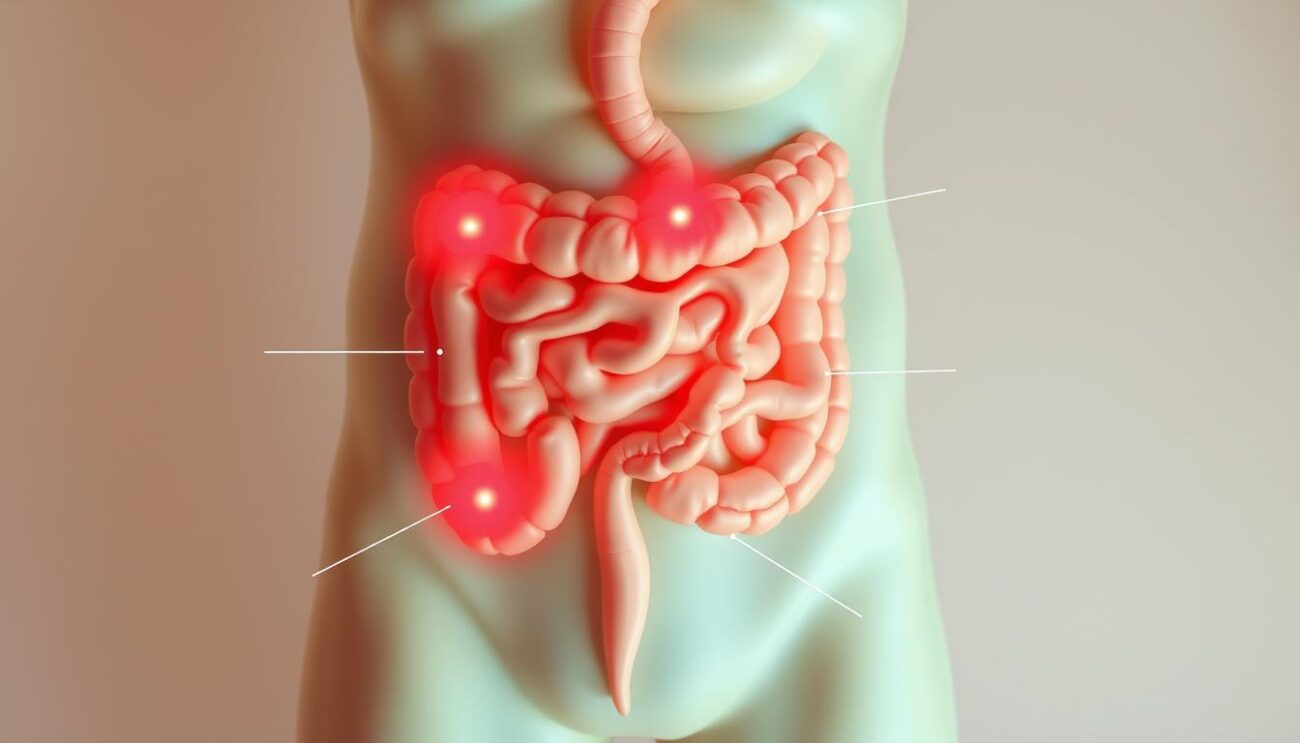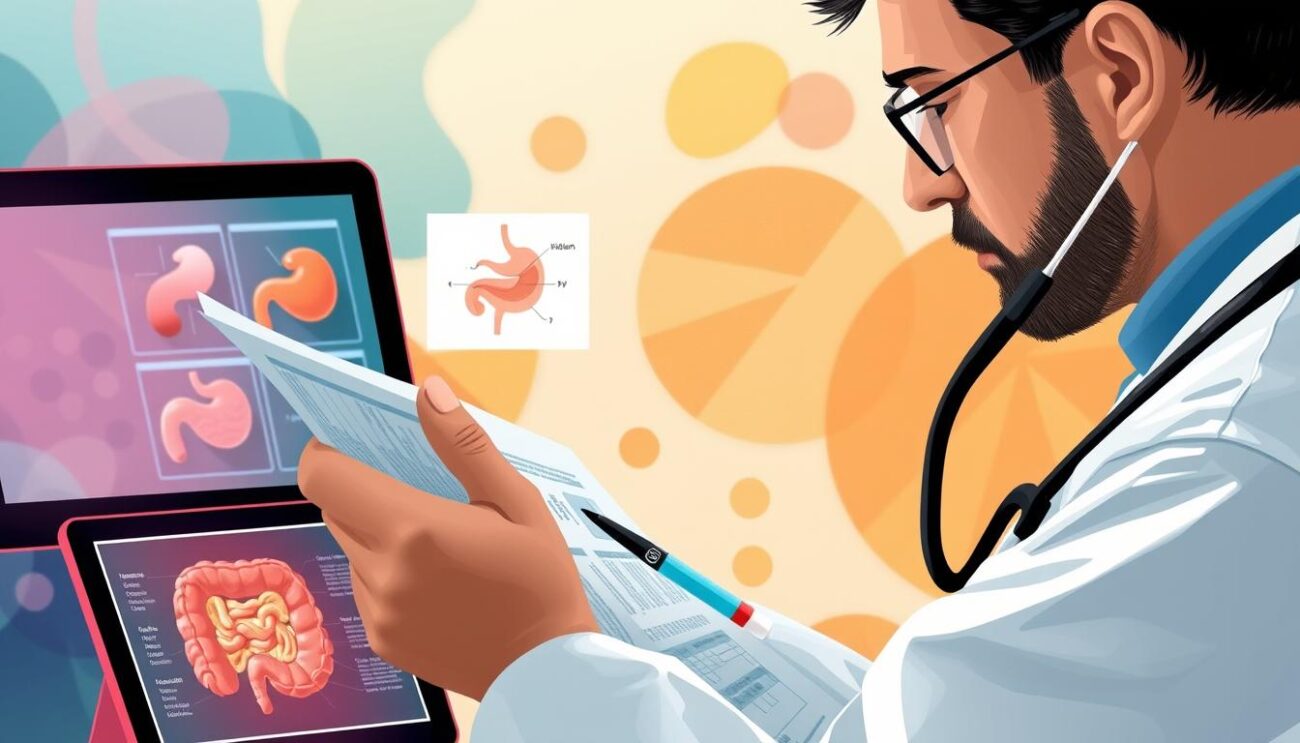Did you know that irritable bowel syndrome (IBS) affects up to 15 percent of the United States population? This chronic condition can really change someone’s life. People with IBS often feel their life quality drops and they miss more work because of their symptoms.
IBS is a complex disorder that affects the stomach and intestines, also known as the gastrointestinal tract. Symptoms include stomach pain, changes in how often you go to the bathroom, feeling bloated, and changes in how often you go to the bathroom. The exact reasons for IBS are still not fully known, but stress, diet, and genetics are thought to be involved.
Interestingly, women are twice as likely to get IBS as men in Western countries. Most people with IBS start showing symptoms before they are 40 years old. This often starts in childhood or early adulthood.

Key Takeaways
- IBS is a chronic gastrointestinal disorder that affects up to 15% of the US population.
- Women are twice as likely to experience IBS compared to men.
- Symptoms of IBS can include abdominal pain, changes in bowel habits, bloating, and altered bowel movement frequency.
- Factors like stress, diet, and genetics are believed to contribute to the development of IBS.
- Most individuals with IBS experience symptoms before the age of 40.
Overview of Irritable Bowel Syndrome
Definition and Prevalence
Irritable Bowel Syndrome (IBS) is a condition where the digestive tract looks normal but doesn’t work right. The muscles in the intestines can spasm, causing pain, constipation, or diarrhea. It affects up to 15% of people, especially women and younger folks. Most people with IBS don’t get medical help.
Impact on Quality of Life
IBS can really lower a person’s quality of life, leading to missing work and feeling bad overall. About 12 percent of people see doctors for IBS issues. It’s most common in South America and least in Southeast Asia. In the U.S., Canada, and Israel, women have more IBS symptoms than men. Women often report more abdominal pain and constipation, while men report more diarrhea. IBS is less common as people get older.
IBS comes in different types: IBS with diarrhea (IBS-D), IBS with constipation (IBS-C), and IBS with mixed symptoms (IBS-M). In the U.S., IBS types are evenly spread, but in Europe, IBS-C or IBS-M might be more common.
Symptoms of IBS
Common Symptoms
Irritable bowel syndrome (IBS) brings many symptoms that can change your daily life. You might feel abdominal pain, cramping, or bloating, especially when you go to the bathroom. You could also notice changes in how often you go or what your stool looks like. Sometimes, you might feel more gas or mucus in your stool.
Distinguishing Features
IBS often makes you feel like you didn’t fully empty your bowels after using the restroom. It can switch between being constipated and having diarrhea, often due to food, stress, or other things. These symptoms can be different for everyone and can come and go, making it hard to handle.
Even though we don’t know everything about IBS, research points to some possible causes. These include food poisoning, antibiotics, stress, and certain gut issues. Stress and anxiety are also seen as triggers for IBS symptoms.
| IBS Subtypes | Key Characteristics |
|---|---|
| IBS with Constipation (IBS-C) | Predominant symptoms are constipation and straining during bowel movements. |
| IBS with Diarrhea (IBS-D) | Frequent, loose, or watery stools are the primary concern. |
| IBS with Mixed Symptoms (IBS-M) | Individuals experience a combination of constipation and diarrhea. |
| IBS Unspecified (IBS-U) | Symptoms do not fit neatly into the other IBS subtypes. |
IBS is more common in women than men. Women might feel more abdominal pain and constipation, while men might have more diarrhea.
“IBS can have a significant impact on a person’s quality of life, leading to missed work or school, reduced social activities, and the need for dietary changes.”
Knowing about IBS symptoms and what can trigger them is key to managing it and feeling better.
What is IBS its Causes Symptoms and Diagnosis
Irritable bowel syndrome (IBS) is a common issue that affects the large intestine. The exact cause is still a mystery, but it might be linked to muscle issues, nervous system problems, severe infections, and changes in gut bacteria. Foods, stress, and other factors can trigger symptoms.
To spot IBS, doctors look for symptoms that happen often, at least 3 days a month for 3 months. IBS mostly hits women and the young, and it can be a big deal for some, affecting their daily life.
Things like food poisoning, being born female, antibiotics, and anxiety or depression might increase the risk of IBS. Stress and anxiety often make IBS symptoms worse for many people. Foods like beans, some fruits and veggies, and certain dairy products can also trigger IBS.
For treating IBS, doctors might suggest different medicines, like for muscle spasms, constipation, antidepressants, or antibiotics, based on the symptoms. If constipation is the main issue, the American College of Gastroenterology suggests drugs like linaclotide (Linzess) and lubiprostone (Amitiza).
IBS comes in four types: IBS-D (diarrhea), IBS-C (constipation), IBS-mixed (both), and IBS-U (varied symptoms). Women with IBS might feel more pain and get constipated, especially during their period or menopause. Men might experience more diarrhea but still have the usual IBS symptoms.
Researchers are still trying to figure out what causes IBS, but they’ve found a few things that might help explain it. Not all IBS patients have abnormal muscle movements, but those with diarrhea tend to have fast gut movements, while those with constipation have slow ones. Most people with IBS have normal gut movements, but still feel bloated and in pain.
Some people with IBS feel more pain than others, which can make symptoms worse. Studies show that IBS patients have different gut bacteria than healthy people, but no single type stands out as the main cause. Small intestine bacterial overgrowth (SIBO) can also cause IBS symptoms like bloating and pain.
“Irritable bowel syndrome (IBS) is a complex disorder that can have a significant impact on an individual’s quality of life. Understanding the potential causes, symptoms, and diagnostic criteria is crucial for effective management and treatment.”
Pathophysiology of IBS
Irritable Bowel Syndrome (IBS) is a complex condition with a complex pathophysiology. At its core, it involves issues with how the intestines move and how sensitive they are. Problems with the muscles in the intestines can cause either constipation or diarrhea, which are key symptoms of IBS. Also, the nerves in the digestive tract can become too sensitive, leading to pain and discomfort from normal activities.
Role of Motility Disturbances
IBS is marked by disruptions in how the intestines move normally. Research shows that 25-75% of people with IBS have issues with how their intestines move. Those with IBS-D have fast movement, while those with IBS-C have slow movement. But, not everyone with these issues will have the same symptoms like bloating or pain, as many with IBS-D or IBS-C have normal movement.
Visceral Hypersensitivity
IBS also involves nerves in the digestive tract being too sensitive, known as visceral hypersensitivity. This sensitivity can make people feel pain or discomfort from normal things, adding to IBS symptoms. Stress, anxiety, and infections can make this sensitivity worse, making IBS symptoms worse.
Many factors, including motility issues, nerve sensitivity, and environmental factors like infections and stress, play a role in IBS. Understanding these factors is key to managing and treating IBS effectively.
Diagnosis of IBS
Irritable bowel syndrome (IBS) is diagnosed using the Rome IV criteria. You need to have stomach pain at least once a week. This pain must be linked to two or more of the following: 1) feeling better after going to the bathroom, 2) changes in how often you go to the bathroom, and 3) changes in your stool’s look. These symptoms must have lasted for at least three months, with the start at least six months before being diagnosed.
IBS can be one of four types: constipation-dominant, diarrhea-dominant, mixed, or unclassified. Tests may be done to check for other conditions like celiac disease, inflammatory bowel disease, or lactose intolerance.
Additional Diagnostic Considerations
Your healthcare provider might use more tests to make sure they have all the information needed. If you’re losing weight, bleeding from the rectum, have a fever, or diarrhea that won’t stop, it could mean something serious. They might do a colonoscopy, CT scan, upper endoscopy, lactose intolerance tests, breath test, or stool tests.
By using the Rome IV criteria and looking at all your symptoms, your doctor can accurately diagnose IBS and create a treatment plan.

| Diagnostic Tool | Purpose |
|---|---|
| Colonoscopy | Examine the colon for any abnormalities |
| CT Scan | Imaging test to rule out other conditions |
| Upper Endoscopy | Examine the upper digestive tract |
| Lactose Intolerance Test | Determine if lactose is a trigger |
| Breath Test | Detect small intestinal bacterial overgrowth |
| Stool Tests | Check for bacterial presence or bile acid issues |
Risk Factors for IBS
Irritable Bowel Syndrome (IBS) is a complex condition with many factors at play. Knowing what might increase the risk can help both individuals and doctors manage it better.
Studies show that people under 50 and those born female are more likely to get IBS. If you have family members with IBS, your risk goes up too, hinting at a genetic or environmental link.
Our mental health is also a big factor. Feeling anxious, depressed, or stressed can make IBS symptoms worse. Trauma, like abuse, can also play a part in getting IBS.
What we eat and how we live can up the risk of IBS too. Foods like dairy, wheat, and some sugars can set off symptoms. Also, some medicines, like antibiotics and antidepressants, might make IBS worse.
Knowing these risk factors helps doctors spot who’s more likely to get IBS. This way, they can offer better prevention and care. It’s all about making life better for those dealing with this tricky condition.
Management of IBS
Managing irritable bowel syndrome (IBS) often means making changes in lifestyle and diet, and using medicines. By finding and dealing with the causes and triggers of IBS, people can ease their symptoms and live better.
Lifestyle and Dietary Modifications
Making lifestyle changes can really help with IBS. About 60% of people with IBS see better symptoms with diet and lifestyle changes. Studies show that 70% of IBS patients feel better with more exercise and less stress. A low-FODMAP diet, which limits certain carbs, helps many people with IBS.
Pharmacological Treatments
Some people need medicines to help with IBS symptoms. Around 30%-40% of IBS patients use medication, depending on their symptoms. Fiber supplements, laxatives, and antidiarrheals can fix bowel issues. Low-dose antidepressants may also be used to help with pain and symptoms. Probiotics are sometimes recommended and are being studied for their benefits.
Mental health therapies like cognitive behavioral therapy and gut-directed hypnotherapy can really help IBS patients. About 40%-50% of people find these therapies helpful. Acupuncture can also help with anxiety, fibromyalgia, migraines, and insomnia from IBS, and can affect the gut directly.
It’s key for IBS patients to work with their doctors to create a plan that works for them. By following their advice and talking about any issues, people can find the best mix of lifestyle, diet, and medicine to manage their IBS.

Complications and Prognosis
IBS doesn’t lead to serious issues like changes in bowel tissue or an increased risk of colorectal cancer. Yet, its chronic nature and impact on life can cause secondary problems. For example, people with IBS might get hemorrhoids from constipation or diarrhea. Also, IBS often goes hand in hand with mood issues, like depression and anxiety.
Fortunately, IBS has a good outlook, and managing it won’t likely change over time. With lifestyle changes, diet tweaks, and sometimes medication, many people with IBS can control their symptoms. This helps them keep a good quality of life.
Subcategories of IBS
IBS is not one condition but four types: IBS with diarrhea (IBS-D), IBS with constipation (IBS-C), mixed IBS (IBS-M), and unsubtyped IBS (IBS-U). The symptoms and how to manage them can differ based on the type of IBS.
Gender Differences in IBS Symptoms
Women with IBS often face more abdominal pain and constipation, especially during menstruation and menopause. Men, on the other hand, might have more diarrhea.
| IBS Subtype | Predominant Symptom | Prevalence |
|---|---|---|
| IBS-D | Diarrhea | 30-40% |
| IBS-C | Constipation | 15-20% |
| IBS-M | Mixed (Diarrhea and Constipation) | 30-40% |
| IBS-U | Unspecified | 10-15% |
Knowing about IBS complications, prognosis, and the differences between types and genders helps people with IBS. They can work with their doctors to find the best ways to manage their symptoms. This can greatly improve their quality of life.
Conclusion
Irritable bowel syndrome (IBS) is a common gut issue that can really affect your life. We don’t fully know what causes it, but it seems to be linked to many things like your body, mind, and environment. To help manage IBS, you can try changing your lifestyle, eating differently, and using certain medicines.
Even though IBS is ongoing, it doesn’t make you more likely to die or get other gut problems. But, it can still change your daily life a lot. You might work less, miss more days off, and use more healthcare services. Knowing about IBS and how to handle it can help you take charge of your health and feel better.
Handling IBS means looking at it from many angles. Work with your doctor and make changes in your life and diet. Use any medicines you need to get your gut health back under control. With the right support and treatment, you can deal with IBS and live a happy life.
